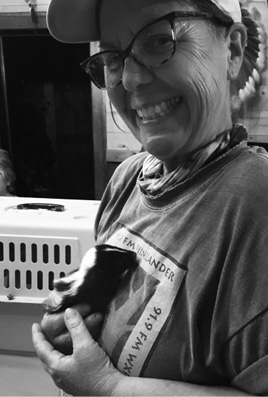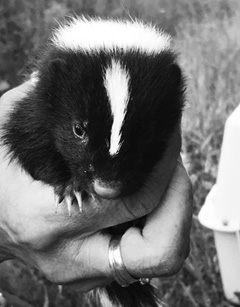Skunks and rejection
Mark 6:1-13
I’ve been thinking a lot about the idea of rejection. Why was Jesus rejected in Nazareth? What does it mean to be rejected? Well, here’s a thought: One of the most rejected animals that lives around here and most places is the lowly skunk. Do you like skunks? No? Why not? Because they smell. Because they dig up your nice lawn looking for grubs. They uproot plants. Because they spray. They spray your dog. Yes, that’s such a nuisance. That odor lasts a long time. They are easily recognizable by their long fur and black and white markings, and I know we don’t like to see them around the campground. We take offense at them.
In fact, we heard a gunshot from the neighbor’s house one Sunday and then we smelled that distinct odor wafting in the air. Really we thought nothing much of it until a few days later, when my husband reported to me that he saw six baby skunks playing in the grassy driveway of the old fallen down house across the street. Six little babies. That was a Tuesday, and on Thursday I decided to walk over there to see if they were still around. Sure enough, there were two of them, each no bigger than my hand. There were flies buzzing around their heads in the bright sunshine, and it was dry as a bone that day, with no puddles in sight. I went home and returned with my daughter and a large flat pan of water and set it beside them on the two-track drive. At least they could get a drink close by, but they weren’t at all interested.
We noticed right away these babies weren’t stinky. They tottered right up to our feet as if they were expecting something good to come from us. They weren’t going to spray us. They were so innocent and seemed so trusting. In fact, they didn’t seem to understand the concept of “fear,” as in “fear of humans.” We knew not to touch them, but that’s because we doubted their innocence. It was obvious they were on their own, just the two of them, shaking the dust off their tiny feet. Yet, they seemed too little to be exploring without adult supervision. Maybe they were looking for food. Or water. Or their Mama. Or sympathy. Empathy. Maybe just for someone to take notice.
As we crossed the street, my daughter said to me, “So, what are we going to do about this?”
“What do you mean?” I asked in return.
“What are you going to do? You can’t just leave them there to die,” she said in a statement of sheer faith.

I thought about that for a brief few seconds. Because I could just leave them there to die. Passively ignore them. You don’t have to actively shoot something in order to reject it, to kill it. How could anything good come out of that old decrepit Nazareth? How could anything good come out of this? And, in the past, that’s my usual train of thought – to do nothing, to walk away from someone else’s problem. It’s really none of my business, not my responsibility. I could settle comfortably in the status quo. I could reject thoughts of anything new from my usual and normal default way of looking at things in my own backyard or, in this case, the yard across the street. It’s just not the way we do things, I told her.
Rejection and dismissal are actually quite common and justifiable decisions we humans will make. And, for various reasons, we do it all the time. And that insight helps me to understand why the hometown folks in Nazareth would reject the hometown boy Jesus when he came there to teach, heal, and preach. People rejected Jesus with his wild talk of thinking something new and different about God. He taught with authority, but he was not born of the right aristocracy or social class. He wasn’t properly credentialed to speak with authority. He came from poverty. And this was scary to the people who knew him as just “a carpenter,” a manual laborer who pounded nails, or “the son of Mary,” with a questionable fatherhood. He had no status at all to make the theological claims he was making about the nature of God and God’s kingdom.
So, though they recognized the wisdom of his teaching and the compassion in his healing, the Nazarenes were not able to accept the incongruity of what Jesus was saying and doing, the discrepancy with their firmly conceived notions of who he was. The puzzle pieces didn’t fit together. It was easier, and perhaps safer, to reject Jesus and be offended by him than to change one’s thinking on who he could be. And this confirmation bias, shared among individuals, mushroomed into a very public rejection that constituted a community bias – a shared confirmation of rejection and offense toward Jesus of Nazareth.
Lest you think this is ridiculous, bear in mind we do this all the time when we refuse to change our mind or our opinions on politics or people when presented with new conflicting information on what we already believe. That’s confirmation bias. The human brain welcomes information that confirms what it already thinks, and resists information that disturbs or contradicts what it already thinks. Bias is simply that pattern of distortion in our ability to see what’s there. We aren’t objective when we come to anything; we have a whole set of inclinations or prejudices built in for acceptance and resistance. It’s really hard then to look at anything as new.
So it is with the challenges in life with the people that we meet. It is easier, and perhaps safer, to reject others and be offended by them than it is to change one’s thinking on who they could possibly be. And when we do this, I believe we are also rejecting Jesus. Thus, I can still have salvific faith in Jesus Christ as the way, the truth, and the life but still harbor resistance toward accepting his image in other people. Because it is difficult to see a familiar face in a new context and it’s hard to shake off opinions that we’ve justified, that have hardened like concrete.
We all know people in our lives whom we reject and take offense at. They are the skunks. Perhaps those who are homeless in our community – they pollute the public spaces with a disheveled presence; perhaps those with mental illness and deplorable hygiene – they just don’t belong in the public eye; perhaps those who are alcohol or drug addicted who need to just get a life and control themselves; perhaps the convicted criminals who settle in our town and because of something stupid you once did, I will always see you as a scary misfit. Can’t you just live someplace else? Because you don’t really belong here in my neighborhood.

How we treat the least of those among us is indicative of how we meet Jesus in the world. “Least” is a very subjective term here, which means it is not a constant; some will see you as the lesser; you will see others as lesser. In rejecting other people, we reject Jesus all the time. In finding offense and putting limitations on other people, we are offended by Jesus Christ himself.
In the second half of our gospel text – the Mission of the Twelve – Jesus even warns the disciples that they also will face rejection. In the words of
Jesus, “If any place will not welcome you and they refuse to hear you, as you leave, shake off the dust that is on your feet as a testimony against them.” Jesus knows rejection, and Jesus knows there will be people offended by the gospel message.
Returning to the orphaned skunks, something different happened to me that day. Something in the tone of my daughter’s voice got my attention. In her plea to me, something new got through. And, I didn’t just walk away. I did something different, and reached out to a person who partakes in wildlife rehabilitation. Her rescue skills are a story unto itself, but I want to just share that I witnessed something different that day in this woman’s love of these needy creatures. My daughter and I, along with my husband, spent several hours at her home rehydrating the babies, dropperful by dropperful, one lick at a time. We tediously removed globs of fly eggs from their fur with a mascara brush. We gave one of them a bath. And we kept them warm as we cuddled them, as we held them in our hands. We felt something rare and significant that evening. It’s hard to put words to it, but I think it was love we experienced. The love that flows when we surrender our resistance to notions of rejection and offense. There is a bigger table awaiting us when we allow ourselves to open up to something new. That, my friends, is the gospel message, and that is the beauty of this story. Amen.
Donna Ahlberg is a retired social worker who enjoys an exegetical challenge. Originally from the East Coast, she has lived with her husband Duff on their cattle farm near Iron River, Michigan, for decades.
